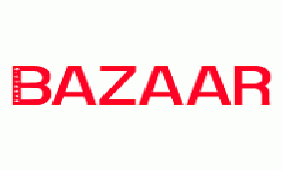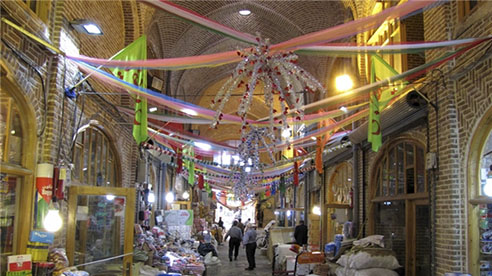
World’s Largest Roofed Bazaar in Iran Closed for 3 Days, Anti-Coronavirus Efforts Continue

Tabriz Bazaar Complex, is the largest covered bazaar in the world in which commercial and trade-related activities, social gatherings, and educational and religious practices are made.
The businesspersons in the historical bazaar have decided to keep closed the complex as of Saturday to assist the health ministry authorities to disinfect it and prevent the spread of coronavirus disease.
Also, the organization of cultural heritage and tourism of Fars province in Southern Iran announced on Wednesday that all historical sites of the province, including Hafeziyeh and Sa’adiyeh and Persepolis are closed to the public during the Nowrouz holiday (to start on March 20).
Meantime, in other parts of the country, all walks of life have united to produce different disinfectants, masks and medical equipment, increasing attempts to sterilize the streets, hospitals and other public places.
In the Southwestern city of Shoushtar in Khuzestan province, an entrepreneur who produces foodstuff has launched the production line of inedible alcohol to provide the needs in the province to the disinfecting material.
Meantime, Pasteur Institute of Iran produced 20,000 kits for diagnosis of coronavirus to be sent to different parts of the country.
Also, the herbs research center of Islamic Azad University in Shahr-e Qods town near Tehran started production of herbal sterilizing gels to be distributed among people in the province.
In addition, a knowledge-based company produced a water-based disinfecting solution which remains on the surface for four hours. Unlike alcohol, the skin is not sensitive to this new substance.
Meantime, Mayor of the Northern city of Amol in Mazandaran province Seyed Hamid Hashemi said that the third stage of disinfecting operations in the city has started, adding that the markets under the supervision of the municipality and the parks have been closed.
“Over 20 tons of lime has been used to disinfect the street water channels and other potential contaminated areas,” he added.
Reports from different provinces, including Golestan in Northeast and South Khorassan in East Iran, also showed that hundreds of patients infected with the novel coronavirus have recovered and left hospitals.
More than 119,000 people have been diagnosed with COVID-19 in the world with over 4,300 deaths so far, the vast majority of them in China where the virus originated late last year.
The coronavirus is spreading in the Middle East, Europe, US and other parts of the world, while parts of China begin to lower their emergency response level as the number of new cases reported there continues to slow.
Authorities across the United States reported over 1,000 cases of coronavirus and 31 deaths as of Tuesday.
More than 60 million people in Italy have been placed under lockdown after the government extended emergency measures across the entire country in an attempt to stop the spread of the coronavirus.
Italy is struggling to contain Europe’s worst outbreak of Covid-19, which has claimed 631 lives and infected over 10,000 people.
On Wednesday, the death toll from the coronavirus outbreak in Iran rose to 354 with 9,000 confirmed cases.
Some 2,959 patients infected by the coronavirus have so far recovered from the disease in Iran.
As the death toll from the virus surges, Iran intensifies its preventive safety measures. Closures of schools and universities have been extended for the next two weeks.
The government also imposed travel restrictions, specially on Iran’s north, which is among the red zones. The country has also adopted strict digital health control procedures at airports to spot possible infections.
Iranian Health Minister Saeed Namaki announced last week that a new national mobilization plan would be implemented across the country to fight against the coronavirus epidemic and more effectively treat patients.
Namaki said that the plan will include all the 17,000 health centers and the 9,000 medical and clinical centers in all cities, suburban areas and villages.
He added that the plan will include home quarantine, noting that infected people will receive the necessary medicines and advice, but they are asked to stay at home.
Namaki said that people with a more serious condition will stay at the hospitals, adding that the public places will be disinfected, the entries of infected towns and cities will be controlled to diagnose and quarantine the infected cases.
He added that the necessary equipment and facilities have been provided, expressing the hope that the epidemic would be curbed.
Namaki said that the number of medical laboratories to test coronavirus infection has reached 22, and will increase to 40 soon.
The World Health Organization (WHO) says Iran's response to the virus has so far been up to the mark. Still, it says the US sanctions are a big challenge, and Washington would be complicit in the rising death toll in Iran if it would not remove its sanctions.
The World Health Organization has considered priorities in combating coronavirus and Islamic Republic of Iran obeys and follows up priorities as defined by WHO.
The WHO is dispatching separate delegations to all countries.



Newmont nets $100M payment related Akyem mine sale

First Quantum scores $1B streaming deal with Royal Gold

Caterpillar sees US tariff hit of up to $1.5 billion this year

Gold price rebounds nearly 2% on US payrolls data

Copper price collapses by 20% as US excludes refined metal from tariffs

St Augustine PFS confirms ‘world-class’ potential of Kingking project with $4.2B value

B2Gold gets Mali nod to start underground mining at Fekola

Goldman told clients to go long copper a day before price plunge

Copper price posts second weekly drop after Trump’s tariff surprise

Codelco seeks restart at Chilean copper mine after collapse

US slaps tariffs on 1-kg, 100-oz gold bars: Financial Times

BHP, Vale offer $1.4 billion settlement in UK lawsuit over Brazil dam disaster, FT reports

NextSource soars on Mitsubishi Chemical offtake deal

Copper price slips as unwinding of tariff trade boosts LME stockpiles

SAIL Bhilai Steel relies on Danieli proprietary technology to expand plate mill portfolio to higher steel grades

Alba Discloses its Financial Results for the Second Quarter and H1 of 2025

Australia weighs price floor for critical minerals, boosting rare earth miners

Australia pledges $87M to rescue Trafigura’s Nyrstar smelters in critical minerals push

Fresnillo lifts gold forecast on strong first-half surge

US slaps tariffs on 1-kg, 100-oz gold bars: Financial Times

BHP, Vale offer $1.4 billion settlement in UK lawsuit over Brazil dam disaster, FT reports

NextSource soars on Mitsubishi Chemical offtake deal

Copper price slips as unwinding of tariff trade boosts LME stockpiles

SAIL Bhilai Steel relies on Danieli proprietary technology to expand plate mill portfolio to higher steel grades

Alba Discloses its Financial Results for the Second Quarter and H1 of 2025

Australia weighs price floor for critical minerals, boosting rare earth miners

Australia pledges $87M to rescue Trafigura’s Nyrstar smelters in critical minerals push

Fresnillo lifts gold forecast on strong first-half surge














